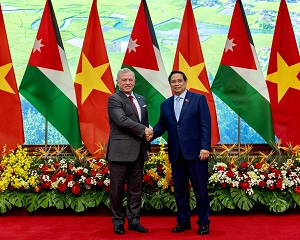From Occupation to Execution: How Israel’s Draft Law Violates International Humanitarian Law - By Hasan Dajah , The Jordan Times
|
The Israeli occupation government has recently been moving towards enacting legislation that would allow the execution of Palestinian prisoners. This proposal cannot be viewed as a purely internal legislative matter, but rather as a step that violates the rules of public international law, international humanitarian law, and human rights conventions, and contradicts the fundamental principles established by the United Nations since its founding. The core of the issue is not merely the punishment itself, but the nature of the relationship between the occupying power and the occupied people, and the rights guaranteed to people struggling for self-determination.
Since the adoption of its Charter in 1945, the United Nations has established a legal and moral foundation affirming the principle of the right of peoples to self-determination, a principle subsequently reaffirmed in several UN resolutions, including Resolution 1514 (XV) of 1960, which explicitly affirmed the legitimacy of the struggle of people under colonial domination or foreign occupation. As stipulated in the First Additional Protocol to the Geneva Conventions of 1977, armed conflicts waged by people against foreign occupation are recognized as international conflicts. This entails rights for combatants and prisoners of war, prohibiting their treatment as criminal offenders.
According to international humanitarian law, prisoners of war, or those detained for reasons related to conflict or resistance, enjoy special protection. The Third Geneva Convention of 1949 emphasizes the guarantee of a fair trial according to international standards and prohibits arbitrary punishment or the use of the judiciary as an instrument of political reprisal. The Convention also prohibits subjecting prisoners to any violence, threats, or humiliation, and forbids the imposition or execution of a death sentence except after a fair trial with guarantees of defense and review. However, the Israeli bill contradicts these principles, as it is not based on a legitimate legal framework but rather on political and vindictive motives, targeting a specific group based on their national identity rather than on objective legal criteria.
The bill also constitutes a flagrant violation of the International Covenant on Civil and Political Rights of 1966, Article 6 of which stipulates that the death penalty... Where it still exists, it should only be applied to the “most serious crimes,” and only after a fair trial before an independent and impartial judiciary. However, the facts in Israeli military courts indicate conviction rates exceeding 99%, according to reports from international organizations. This raises serious doubts about the integrity of the military justice system for Palestinian detainees and demonstrates that trials under occupation fail to meet even the minimum standards of procedural justice.
The Universal Declaration of Human Rights (1948), in its Article 10, affirms the right of every person to a fair and public trial before an impartial tribunal, a right clearly undermined within the Israeli occupation court system. Furthermore, Article 5 of the Declaration and Article 7 of the International Covenant on Civil and Political Rights prohibit cruel, inhuman, or degrading treatment—standards that have been repeatedly violated in the case of Palestinian prisoners.
The legal issue here extends beyond the punishment itself, reaching the very core of the international system, which is based on the illegitimacy of punishing individuals for exercising their fundamental right to resist occupation. The UN Charter, in Article 1, refers to the right of peoples to struggle against foreign domination and affirms the principle of self-determination as one of the organization's fundamental objectives. The International Court of Justice, in its 2004 advisory opinion on the separation wall, also affirmed that the Palestinian people have an inalienable right to self-determination, and that the international community has a duty to respect this right and refrain from taking any measures that impede its exercise.
From the perspective of international humanitarian law, resistance to occupation is not a criminal offense, but rather an act related to an international armed conflict. Therefore, treating combatants as prisoners of war or protected detainees’ remains a legal obligation of the occupying power. Criminalizing the act of resistance and then punishing it with the death penalty constitutes a double violation: a violation of the individual rights of the detainee and a violation of the collective right of the people to resist occupation.
Furthermore, enacting such a law opens the door to a discriminatory policy based on national identity, as it will be applied only to Palestinians. This, according to international law standards, amounts to collective punishment, a clear violation of Article 33 of the Fourth Geneva Convention, which prohibits collective punishment and all acts of terrorism.
Beyond the legal aspect, adopting this legislation carries serious political implications. It paves the way for transforming justice into a tool of revenge, undermines any chance for a just political solution, and fuels violence instead of curbing it. It also contributes to eroding the image of the Israeli judicial system internationally and puts it at odds with human rights institutions and international courts.
International law, including international criminal law, holds political and military leaders directly responsible for decisions that lead to grave violations of international humanitarian law. If implemented, this bill could form the basis for prosecution before the International Criminal Court under the Rome Statute, given that extrajudicial killings, or killings carried out as part of a discriminatory policy, constitute war crimes.
The international community and the United Nations institutions have a clear responsibility: to stand against legislation that legalizes extrajudicial killings. International legitimacy is not a slogan, but a binding commitment. The international community's failure to protect the legal foundation upon which the modern international order is built opens the door to the law of the jungle and threatens the entire human rights system.
The attempt to impose the death penalty on Palestinian prisoners is not a legal measure to maintain security, but a direct violation of international law and a dangerous regression from the principles agreed upon by the world after World War II. Legislation does not legitimize occupation, nor does it negate the right of people to freedom. The right remains clear, and the law is unequivocal: a people under occupation have a legitimate right to struggle for self-determination, and a prisoner is not a criminal, but rather part of an unresolved political issue.
Hassan Dajah — Professor of Strategic Studies at Al-Hussein Bin Talal University




